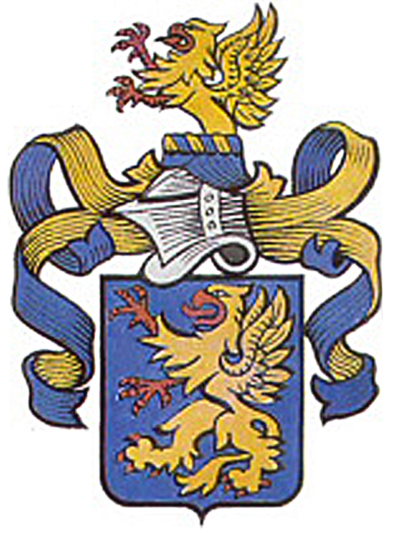Huguenots
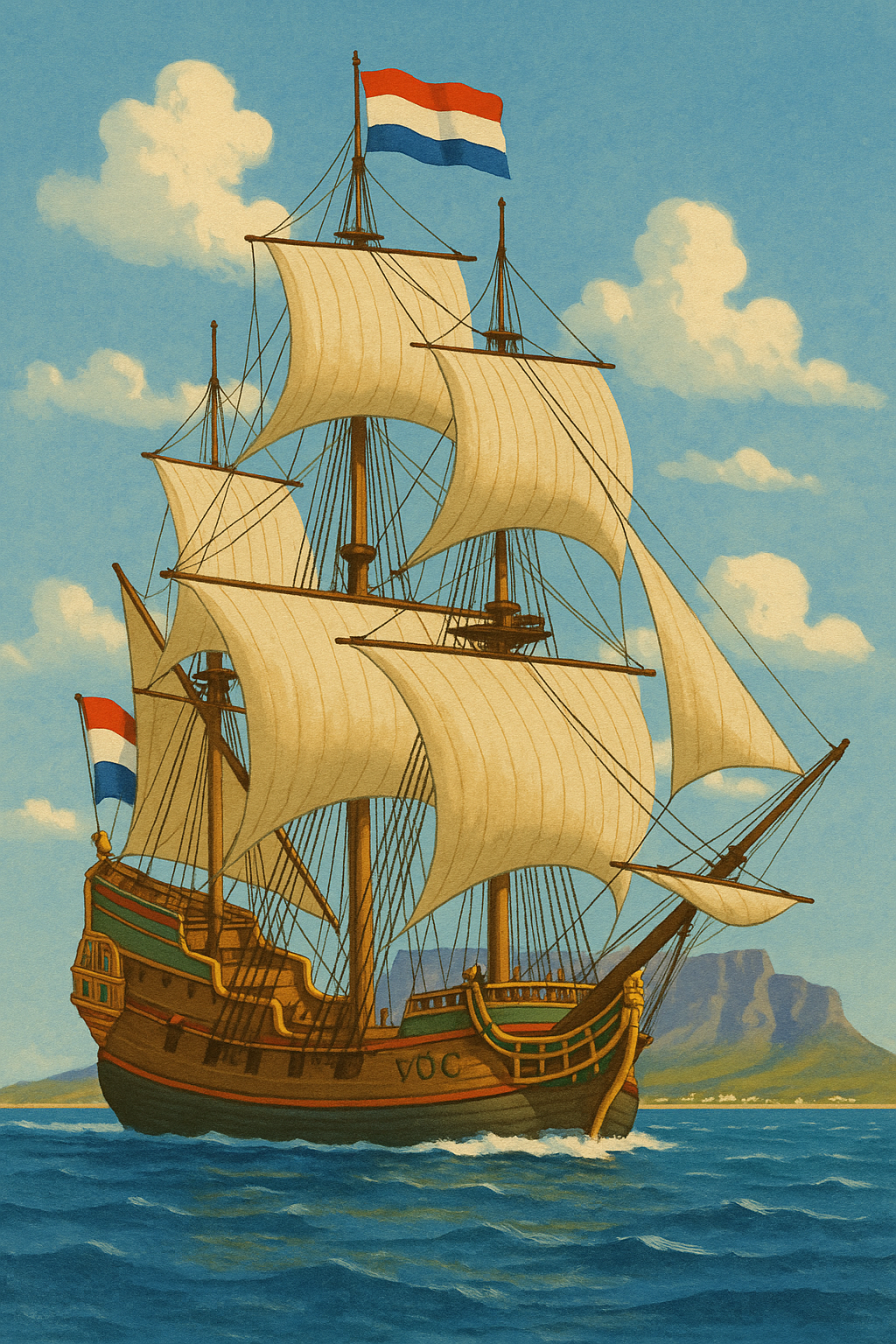
In the northern countryside of France, near Artois, lay the estate of Villiers-au-Bois. It was an old holding nestled in an expansive oak forest, with neat rows of vines that crept up the sun-dappled slopes. The land had been in Jean du Buis's family for three generations. By the year 1685, Jean was in his early forties, a stern but fair man, known for his wine, his sharp blue eyes, and his refusal to bow to the weight of the Catholic crown.
Jean was one of the last Protestant vintners in the region. Many of the old families had either converted or fled. But he had stayed, clinging to the land, raising cows for cheese, tending to his barrels of red and white, and managing a growing timber trade. His oak trees were old and strong, just like him. Twice a year, he carted seasoned planks and sealed wine barrels north to the Dutch-controlled port at Wielingen. The journeys were familiar, the roads known by heart. But by late 1685, even the roads had begun to whisper danger.
That October, everything changed. Louis XIV revoked the Edict of Nantes. Within days, Protestant pastors were arrested. Churches shuttered. Royal dragoons arrived in the village, demanding loyalty to the Catholic faith. Jean's refusal was silent but unmistakable. When the soldiers turned up at Villiers-au-Bois, they didn't knock. They kicked in doors, overturned barrels, and shouted prayers as threats. His wife, Isabeau la Becque, was dragged by her hair before the village priest. Their son, Jan, only twelve, stood between her and the soldiers with a wooden pitchfork.
That night, under the dark canopy of his own forest, Jean made his decision. He kissed Isabeau's bruised forehead and swore he would see her again. The next morning, a trusted Dutch merchant smuggled her and Jan to Zeeland aboard a grain barge. From there, they found passage on a VOC vessel bound for the Cape of Good Hope. Jean remained behind to sell what little he could, bury the family Bible, and burn the rest.
In December, as the first frost silvered the vines, Jean left Villiers-au-Bois for the last time. He wore a woodcutter's cloak, his face smudged with ash, and carried a mule laden with cheese, wine, and planks—his cover for trade. The journey north was cold and dangerous. Catholic patrols roamed the highways. He slept in barns, followed old logging trails, and bribed a border guard with a wheel of Boulogne cheese wrapped in linen.
By mid-January, he reached the outskirts of Vlissingen. From the treeline, he saw the frozen masts of VOC ships in harbor. He dared not approach by day. That night, as sleet needled his shoulders, he approached the Dutch camp and gave the code word passed to him by the merchant who had helped his wife. A Calvinist quartermaster named Van Eck nodded once, and Jean was taken in.
He boarded the Oosterland on the 29th of January, 1688. It was a tall ship with creaking decks and the sour smell of salt and hope. The voyage was brutal. Storms pounded the sails. Men groaned with fever. Jean worked alongside the sailors, hauling ropes, patching leaks, and rationing the last of his wine. He dreamt of Isabeau's face, of Jan's defiant stance, of the oaks of Villiers-au-Bois swaying in the snow.
On the 25th of April, 1688, the Oosterland dropped anchor in Table Bay. The wind was warm, the light golden. Jean, thinner now and gray at the temples, stepped onto the soil of the Cape. He looked inland, toward the mountains. He had no land. No barrels. No trees. But he had made it.
At the foot of the Company's gardens, near the old fort, he found them—Isabeau in a plain linen dress, Jan was taller now, eyes still sharp. They embraced without a word. No one in the crowd understood what passed between them, but in that embrace was a forest, a vineyard, and a lifetime of defiance. Jean du Buis was no longer a wine farmer of Villiers-au-Bois. He was now a refugee. A survivor. A builder of something new.
And in the Cape, the oaks would grow again.
Durand Huguenot Families
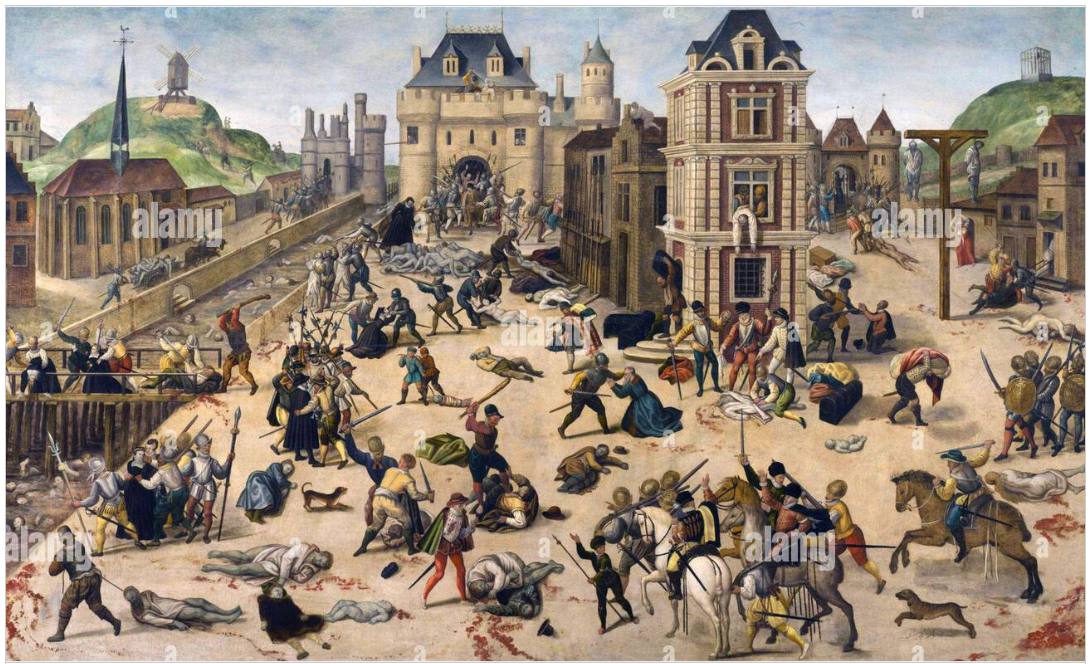
Henri IV, who was 19 years old during the St. Bartholomew's Day Massacre, signed the Edict of Nantes in 1598, making it legal for Protestants to practice their religion. That ushered in nearly ninety years of religious tolerance. This bold move followed the horrors of the St. Bartholomew's Day Massacre of 1572, when thousands of Huguenots were slaughtered in one of history's darkest episodes of religious violence. Yet the peace was not to last. On October 18, 1685, Henri's grandson, Louis XIV, revoked the Edict with the Edict of Fontainebleau, stripping Protestants of their rights and reigniting persecution—forcing many to flee or convert under duress.
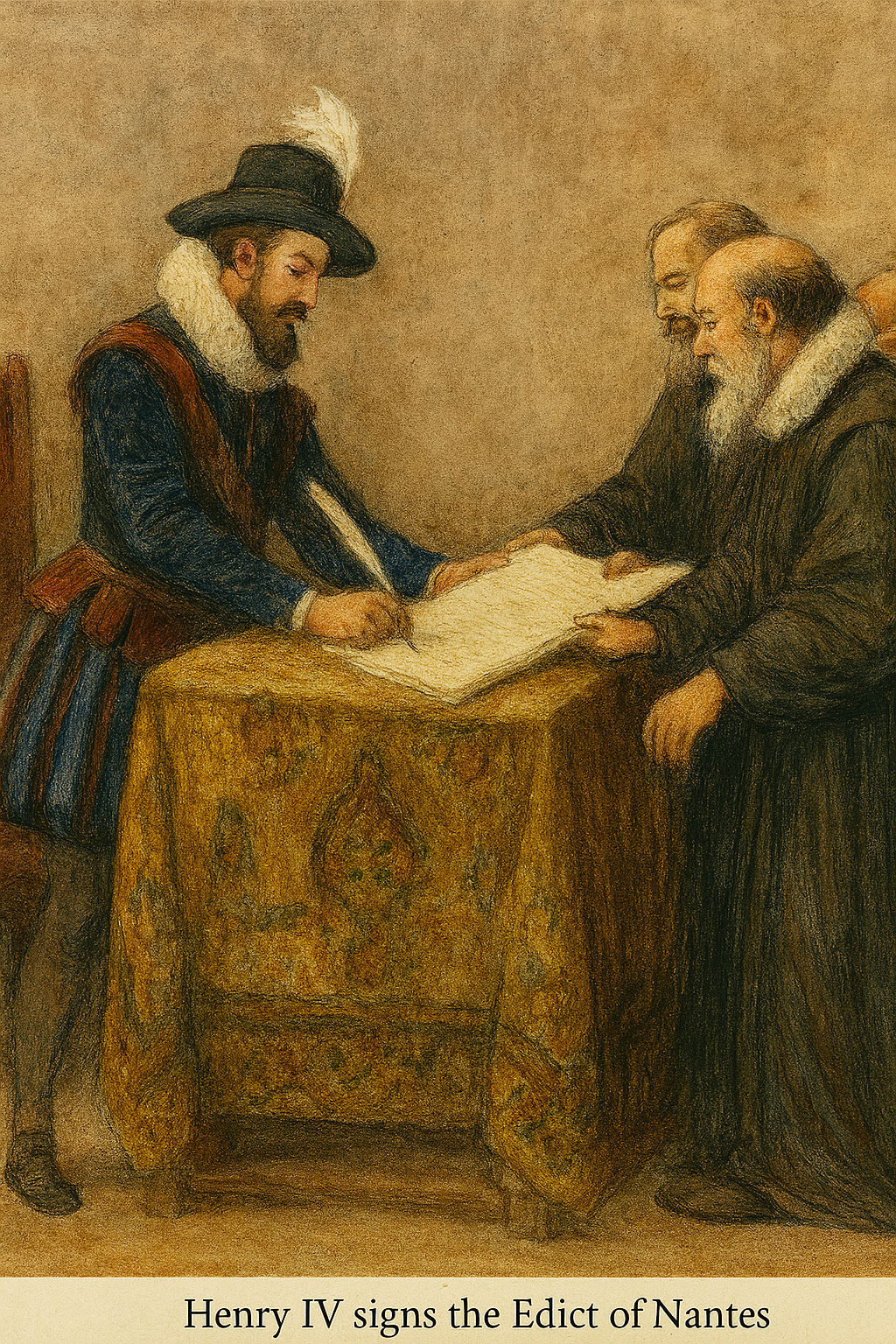
My great-grandfather, Jean du Buis, lived near the Dutch border and managed to board the Oosterland at Wielingen — just over 100 km away. The Malherbes from Normandy travelled three times as far. But consider the du Rands — they came from over ten times that distance.
The first recorded Durand at the Cape was Jean Durand, who sailed on the Wapen van Alkmaar in 1688. He was from Provence, in the mountain village of La Motte‑Chalançon, and eventually settled in the Drakenstein district. For a moment, just consider what he and his family had to endure.
After the Revocation (the Edict of Fontainebleau, 1685), Protestantism was outlawed entirely. Churches were demolished, pastors exiled or executed, and children forcibly taken to be raised as Catholics. Places like La Motte-Chalançon, south-east of Lyon in Provence, were Protestant strongholds — and faced ruthless persecution:
Royal dragoons were quartered inside Huguenot homes to pressure families into converting.
Protestant ministers were exiled, imprisoned, or forced to renounce their faith.
Secret worship gatherings (assemblées du désert) became common in remote hills and forests. If discovered, men could be sent to the galleys, women to convents, and some faced execution.
In the Rhône Valley, just north of them, public executions of Protestants were staged as a warning to others.
Jean Durand and his family had to flee through the Rhône Valley, north of the Alps to safety in Geneva, then travel north-east through German territories, and finally turn north to the Frisian Islands in the far north of the Netherlands. There, on the island of Texel, they boarded the Wapen van Alkmaar — one of the VOC’s smaller East Indiamen.
Do yourself a favour: search La Motte‑Chalançon to Texel on Google Maps. Even today, the shortest route is over 1200 km — a straight path through Paris. Now imagine what that journey must have been like in the late 1600s, on foot or by wagon, dodging soldiers and informants. The journey to the ship alone was an odyssey.
And their voyage to the Cape? That was no less daunting.
From Texel, most VOC ships followed the “Brouwer Route”: down to the Canary Islands, across the Gulf of Guinea, a possible stop at St. Helena for water and fresh provisions, and finally on to the Cape. The Wapen van Alkmaar, which departed in September 1688, reportedly arrived by early January 1689 — nearly four months later.
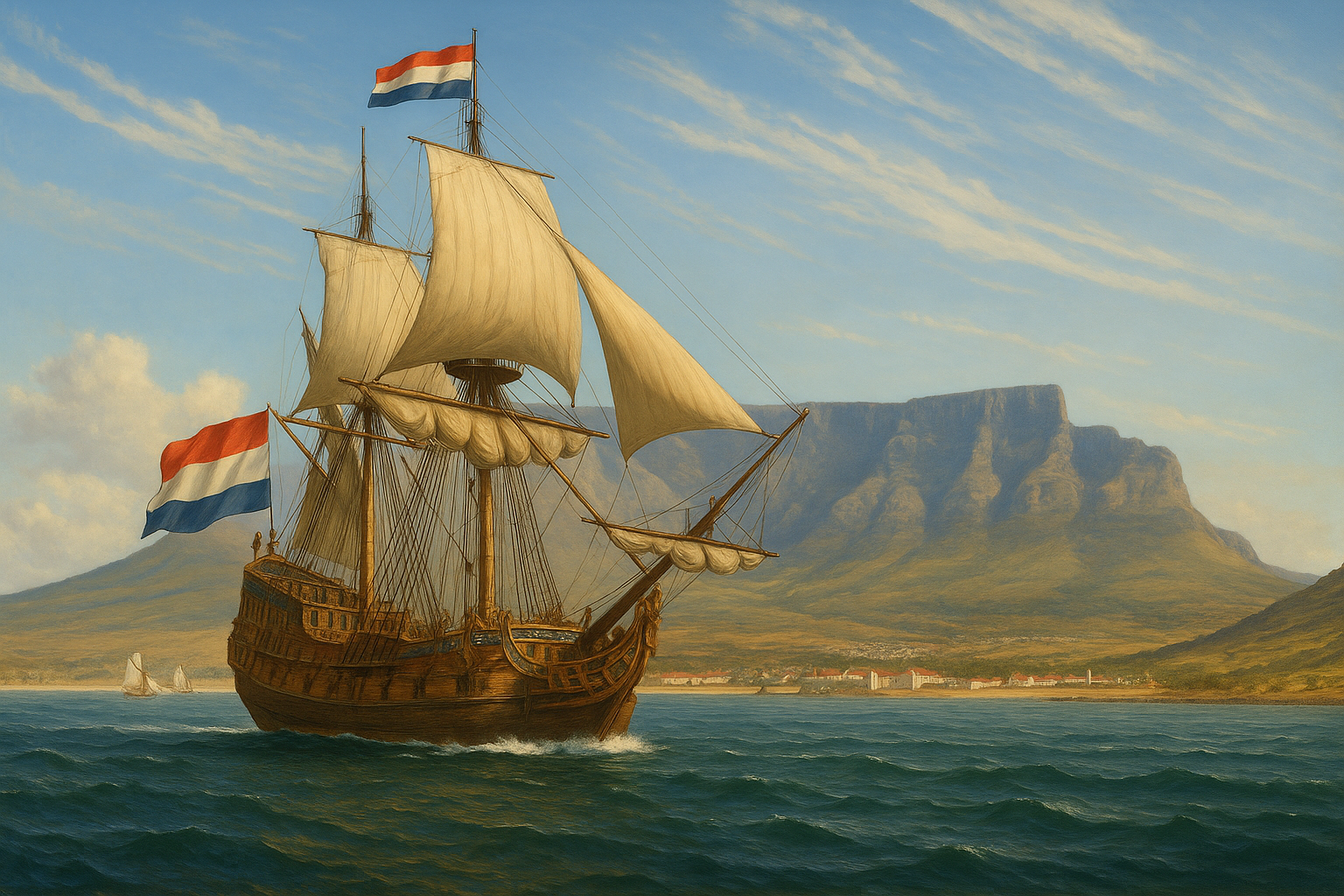
At the Cape — a wild, foreign land under Dutch rule — these refugees had to carve out new lives from scratch. And they did, remarkably. Many settled in the Franschhoek valley — “the French Corner.”
I am just wondering, would Charl du Rand, the jumbo pilot, be a descendant of Jean Durand?
